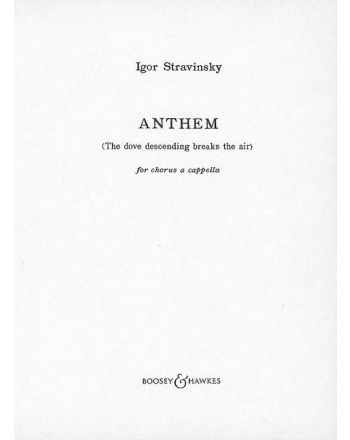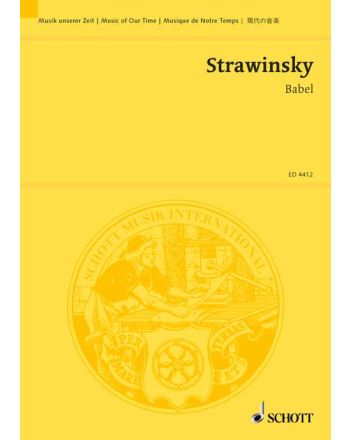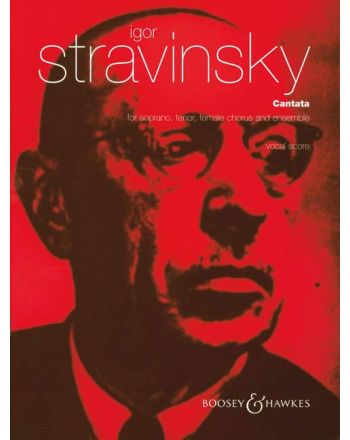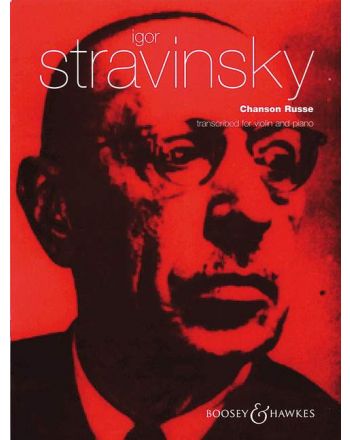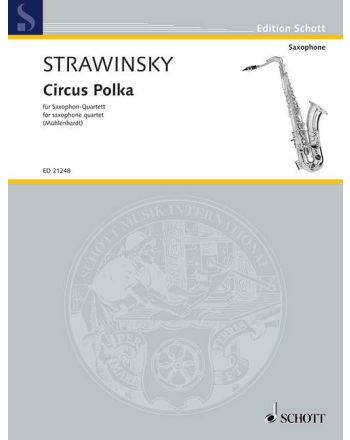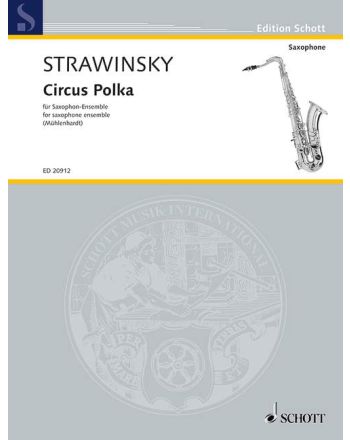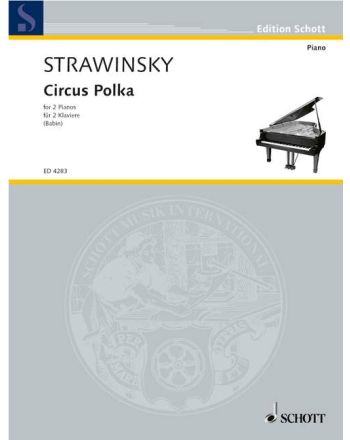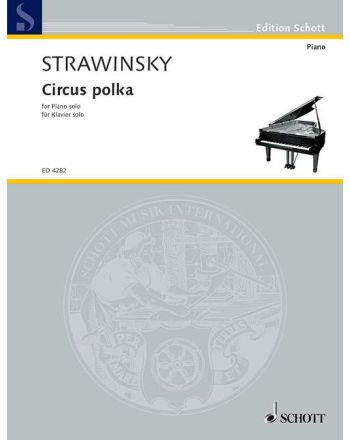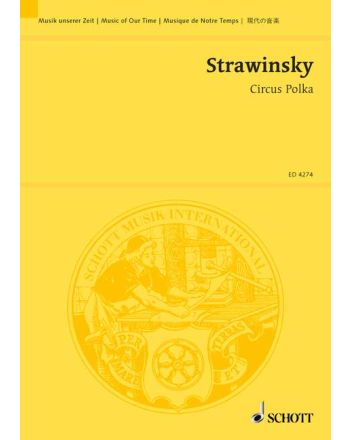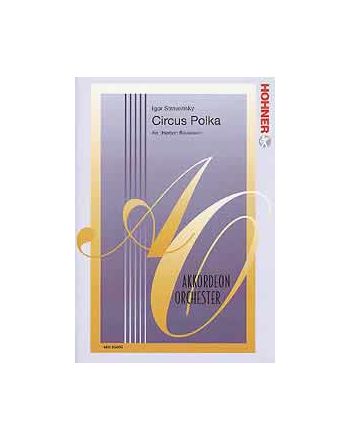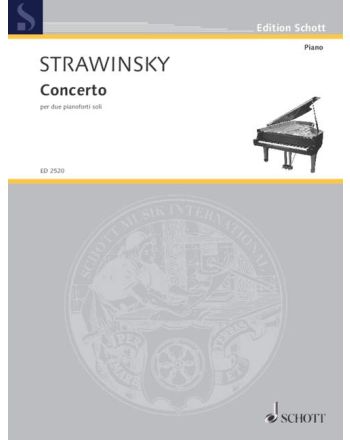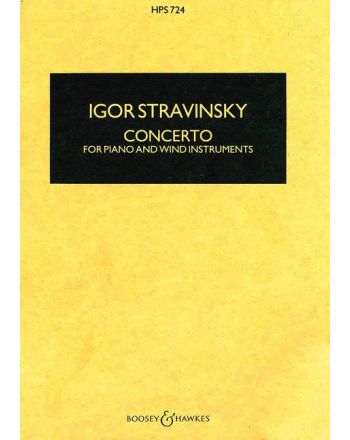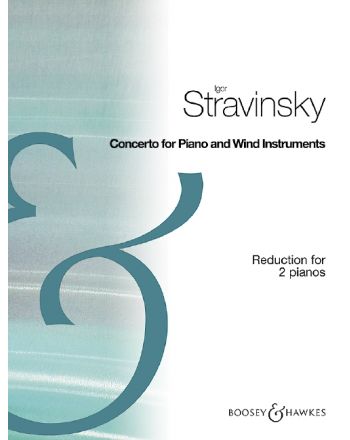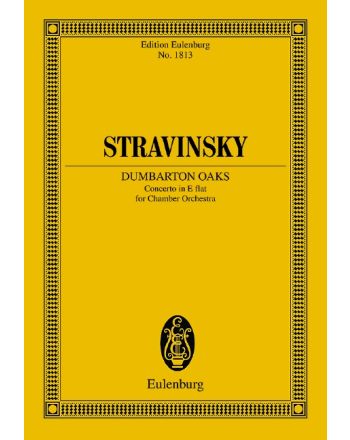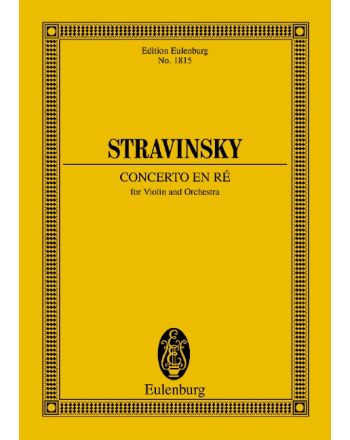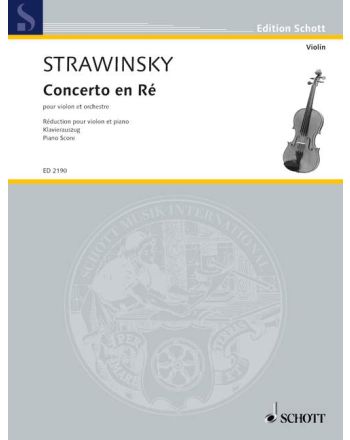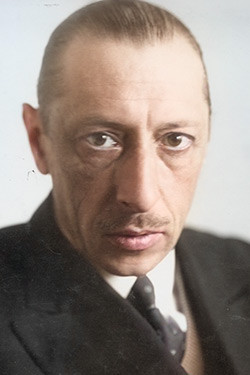
Igor Stravinsky
À venir
À propos de Igor Stravinsky
The first requirement for good art remains first and foremost good workmanship. On doit posséder l'objet [One must have a command of one’s professional material]. Only inaccuracy is suspect. (Igor Stravinsky)
Igor Stravinsky was born on 17 June 1882 in Oranienbaum (now Lomonossov) near St. Petersburg. He grew up in a musical family: his father, Fjodor Stravinsky, was one of the most outstanding opera singers in Tsarist Russia. Alongside a humanist education, Stravinsky received tuition in piano, harmony and composition and soon displayed significant talent for improvisation. He subsequently studied law until 1905, but continued his musical studies at the same time. Nikolai Rimsky-Korsakov was his composition teacher from 1905 to 1908. With his composition Feu d’artifice (1908), Stravinsky made an impression on the Director of the Ballets Russes, Sergei Diaghilev, who engaged him to carry out orchestrations and later commissioned him to compose music for The Firebird in 1909. From 1910 to 1914, Stravinsky lived and composed alternately on his estate Ustilug (Volhynia in the Ukraine) and in Clarens (Switzerland). During this period, Le Sacre du Printemps (1913) was composed and unleashed a theatrical scandal at its first performance in Paris. It was principally the seemingly “barbaric” rhythms which were regarded as being shocking and revolutionary to an equal degree. With the outbreak of the First World War in 1914, Stravinsky returned permanently to Switzerland where he remained up to the year 1920. He subsequently relocated to France where he maintained lively contact with the leading artists in Paris (Claude Debussy, Maurice Ravel, Eric Satie, Pablo Picasso, André Gide and Jean Cocteau). He became a French citizen in 1934. As early as 1935/36, he published his memoirs ("Chroniques de ma vie“) and embarked on an active career as conductor and pianist. At the beginning of the Second World War, Stravinsky gave his much quoted series of lectures at the American Harvard University "Poétique musicale" (published in 1942) and thereby avoided the time of the French Occupation. He took up permanent residence in the USA in 1939 and acquired American citizenship six years later. He participated in the Donaueschingen Music Festival for the first time in 1957 where he conducted the concert performance of his ballet Agon. He developed an interest in serial music and its younger representatives Pierre Boulez and Karlheinz Stockhausen. Following his rehabilitation in the Post-Stalinist USSR, he was once again able to visit his native country. Igor Stravinsky died on 6 April 1971 in New York.
The Paris premiere of L’oiseau de feu on 25 June 1910 was a sensational success for the young and ambitious composer and Stravinsky advanced to become a composer of ballet music par excellence. He gained a worldwide reputation with works such as Pas de deux (1921), Jeu de cartes (1936), Scènes de Ballet (1938) and the subsequent concert suite arrangements of these compositions. Stravinsky’s music is characterised by its brief-structured melodies, often only consisting of a few notes, its typical asymmetrical rhythm and its close relationship with dance. The aesthetic impulse comprises a neo-classical sense of form and a decisive anti-romanticism in opposition to the “unending” melodies of Wagner. In contrast to the earlier ballets, the works composed up to 1920 in Switzerland display a completely different style. In the stage work L’histoire du soldat (1918), created in collaboration with the poet Charles Ferdinand Ramuz, Stravinsky reduces the musical mediums and forms to an aesthetic minimum, incorporating elements of jazz in certain passages. The works composed in America include Symphony in C (1940), Danses concertantes (1941-42), Scherzo à la Russe (1944) and Symphony in three Movements (1945). These orchestral works display Stravinsky at the pinnacle of his neo-classical creative phase. Historical models are transformed with the aid of fragmentation and alienation to produce highly innovative tonal concepts. Stravinsky also experimented with serial techniques in his works composed post-1950.
Stravinsky received numerous prizes: he was the first recipient of the Léonie-Sonning Music Prize in 1959 and was awarded the Wihuri-Sibelius Prize in 1963. The same year, his US-American exile homeland conferred him the honour of a star in the Hollywood Walk of Fame. He received an honorary doctorate from the Rutgers University in New Jersey in 1967. In 1983, the “Strawinski Fountain” was inaugurated on the “Place Igor Strawinski” in close vicinity to the Centre Pompidou in Paris. The 16 sculptures of the fountain represent different works by the composer.
Liste d'œuvres
Chronologie
Pablo Picasso designed the costumes and stage set for the ballet "Pulcinella".
World premiere of the opera "The Rake's Progress" in Venice
Concert tours to East Asia and Europa
Produits
-
No. 1 La NoviceCompositeur: Igor StravinskyMedia Type: PartitionInstrumentation: mezzo-soprano et pianoLangue: Français, AnglaisNuméro du produit: BH 5000280Format papierFormat papierEn stock10,95 €TTC, hors expédition
-
"Souvenirs de mon Enfance"Compositeur: Igor StravinskyMedia Type: PartitionInstrumentation: voix aigüe et pianoLangue: Français, RusseNuméro du produit: BH 5000283Format papierFormat papierEn stock18,95 €TTC, hors expédition
-
Compositeur: Anton Stepanowitsch Arensky | Igor StravinskyMedia Type: Partition avec CDEdition: Edition avec play-alongInstrumentation: piano à 4 mainsNuméro du produit: MMO 3028Format papier + CDFormat papier + CDÉpuisé18,99 €TTC, hors expédition
-
CantataCompositeur: Igor StravinskyMedia Type: PartitionEdition: Partition d'étudeSérie: Hawkes Pocket Scores, HPS 733
Instrumentation: solistes (AT), choeur mixte (SATB), récitant et orchestreLangue: AnglaisNuméro du produit: BH 6500519Format papierFormat papierEn stock19,00 €TTC, hors expédition -
CantataCompositeur: Igor StravinskyMedia Type: PartitionEdition: Réduction pour pianoInstrumentation: solistes (AT), choeur mixte (SATB), récitant et orchestreLangue: AnglaisNuméro du produit: BH 5500047Format papierFormat papierEn stock19,99 €TTC, hors expédition
-
A Sacred BalladCompositeur: Igor StravinskyMedia Type: PartitionEdition: Partition d'étudeSérie: Hawkes Pocket Scores, HPS 762
Instrumentation: baryton et orchestreLangue: Hébreu, AnglaisNuméro du produit: BH 6500485Format papierFormat papierEn stock19,00 €TTC, hors expédition -
Ballet for Twelve DancersCompositeur: Igor StravinskyChef d'orchestre: Hans RosbaudOrchestre/Ensemble: Sinfonieorchester des Südwestfunks Baden-BadenMedia Type: CDNuméro du produit: WER 67712CDCDEn stock18,50 €TTC, hors expédition
-
Ballet for twelve DancersCompositeur: Igor StravinskyMedia Type: PartitionEdition: Réduction pour piano, pour 2 pianosInstrumentation: orchestreNuméro du produit: BH 83678Format papierFormat papierEn stock56,50 €TTC, hors expédition
-
Ballet for twelve DancersCompositeur: Igor StravinskyMedia Type: PartitionEdition: Partition d'étudeSérie: Hawkes Pocket Scores, HPS 701
Instrumentation: orchestreNuméro du produit: BH 6500486Format papierFormat papierEn stock33,50 €TTC, hors expédition -
Compositeur: Igor StravinskyArrangeur: Samuel DushkinMedia Type: PartitionInstrumentation: violon et pianoNuméro du produit: BH 83658Format papierFormat papierEn stock31,50 €TTC, hors expédition
-
"The dove descending breaks the air"Compositeur: Igor StravinskyMedia Type: PartitionEdition: Partition de choeurInstrumentation: choeur mixte (SATB) a cappellaLangue: AnglaisNuméro du produit: BH 5400325Format papierFormat papierEn stock9,00 €TTC, hors expédition
-
Ballet in 2 ScenesCompositeur: Igor StravinskyMedia Type: PartitionEdition: PartitionInstrumentation: orchestre à cordesNuméro du produit: BH 6400311Format papierFormat papierEn stock55,95 €TTC, hors expédition
-
Ballet in 2 scenesCompositeur: Igor StravinskyMedia Type: PartitionEdition: Réduction pour pianoInstrumentation: pianoNuméro du produit: BH 100729Format papierFormat papierEn stock19,50 €TTC, hors expédition
-
Bogoroditse DievoCompositeur: Igor StravinskyMedia Type: PartitionEdition: Partition de choeurInstrumentation: choeur mixte (SATB) a cappellaLangue: SlavonNuméro du produit: BH 83689Format papierFormat papierEn stock5,50 €TTC, hors expédition
-
New version with Latin textCompositeur: Igor StravinskyMedia Type: PartitionEdition: Partition de choeur, mit Klaviebegleitung zu ProbenzweckenInstrumentation: choeur mixte (SATB) a cappellaLangue: LatinNuméro du produit: BH 5400326Format papierFormat papierEn stock4,50 €TTC, hors expédition
-
Kantate nach Moses I, 11, 1-9Compositeur: Igor StravinskyEdition: Partition d'étudeSéries: Music Of Our Time
Babel
Instrumentation: récitant, choeur d'hommes (TTBB) et orchestreNuméro du produit: ED 4412Type de produitEn stockPrix à partir de 13,99 €TTC -
Kantate nach Moses I, 11, 1-9Compositeur: Igor StravinskyMedia Type: Partition électronique en PDFEdition: Partition de choeurSérie: Babel
Instrumentation: récitant, choeur d'hommes (TTBB) et orchestreLangue: Allemand, AnglaisNuméro du produit: ED 4342-01 Q8558Partition PDFPartition PDFEn stock1,99 €TTC -
Kantate nach Moses I, 11, Vers 1-9Compositeur: Igor StravinskyMedia Type: Matériel en location / d'exécutionEdition: Matériel d'exécutionLangue: Allemand, AnglaisMatériel en location / d'exécutionMatériel en location / d'exécution
-
Kantate nach Moses I, 11, 1-9Compositeur: Igor StravinskyMedia Type: PartitionEdition: Réduction pour pianoSéries: Edition Schott
Babel
Instrumentation: récitant, choeur d'hommes (TTBB) et orchestreLangue: Allemand, AnglaisNuméro du produit: ED 4342Format papierFormat papierEn stock19,50 €TTC, hors expédition -
from "The Fairy's Kiss"Compositeur: Igor StravinskyArrangeur: Jeanne GautierMedia Type: PartitionInstrumentation: violon et pianoNuméro du produit: BH 1000296Format papierFormat papierEn stock18,00 €TTC, hors expédition
-
Compositeur: Igor StravinskyArrangeur: Samuel DushkinMedia Type: Partition électronique en PDFNuméro du produit: ED 20423 Q25668Partition PDFPartition PDFEn stock2,99 €TTC
-
Compositeur: Igor StravinskyMedia Type: PartitionEdition: PartitionInstrumentation: orchestreNuméro du produit: BH 6400697Format papierFormat papierEn stock15,95 €TTC, hors expédition
-
Compositeur: Igor StravinskyMedia Type: PartitionEdition: Partition d'étudeSérie: Hawkes Pocket Scores, HPS 666
Instrumentation: solistes (ST), choeur de femmes et ensemble (2 flûtes, 2 hautbois, violoncelle)Langue: AnglaisNuméro du produit: BH 6500488Format papierFormat papierEn stock19,00 €TTC, hors expédition -
Compositeur: Igor StravinskyMedia Type: PartitionEdition: Réduction pour pianoInstrumentation: solistes (ST), choeur de femmes et ensemble (2 flûtes, 2 hautbois, violoncelle)Langue: AnglaisNuméro du produit: BH 5500114Format papierFormat papierEn stock26,95 €TTC, hors expédition
-
Ad honorem Sancti Marci nominisCompositeur: Igor StravinskyMedia Type: PartitionEdition: Partition d'étudeSérie: Hawkes Pocket Scores, HPS 691
Instrumentation: solistes (TBar), choeur mixte et orchestreLangue: LatinNuméro du produit: BH 6500489Format papierFormat papierEn stock18,00 €TTC, hors expédition -
Ad honorem Sancti Marci nominisCompositeur: Igor StravinskyMedia Type: PartitionEdition: Réduction pour pianoInstrumentation: solistes (TBar), choeur mixte et orchestreLangue: LatinNuméro du produit: BH 5500044Format papierFormat papierEn stock15,95 €TTC, hors expédition
-
Compositeur: Igor StravinskyMedia Type: PartitionEdition: Partition d'étudeSérie: Hawkes Pocket Scores, HPS 610
Instrumentation: piano et orchestreNuméro du produit: BH 6500490Format papierFormat papierEn stock32,50 €TTC, hors expédition -
Compositeur: Igor StravinskyArrangeur: Soulima StravinskyMedia Type: PartitionEdition: Réduction pour piano, pour 2 pianosInstrumentation: piano et orchestreNuméro du produit: BH 300129Format papierFormat papierEn stock26,50 €TTC, hors expédition
-
Compositeur: Igor StravinskyMedia Type: PartitionEdition: Réduction pour piano, pour 2 pianosInstrumentation: piano et orchestreNuméro du produit: BH 300066Format papierFormat papierEn stock63,50 €TTC, hors expédition
-
from "Mavra"Compositeur: Igor StravinskyMedia Type: PartitionEdition: Partition d'étudeSérie: Hawkes Pocket Scores, HPS 998
Instrumentation: soprano et petit orchestreLangue: Allemand, Français, Russe, AnglaisNuméro du produit: BH 6500491Format papierFormat papierEn stock12,95 €TTC, hors expédition -
Russian Maiden's SongCompositeur: Igor StravinskyMedia Type: PartitionInstrumentation: violon et pianoNuméro du produit: BH 1000297Format papierFormat papierEn stock12,50 €TTC, hors expédition
-
Symphonic poem in three partsCompositeur: Igor StravinskyMedia Type: PartitionInstrumentation: pianoNuméro du produit: BH 100730Format papierFormat papierEn stock26,99 €TTC, hors expédition
-
über das Weihnachtslied "Vom Himmel hoch da komm' ich her" (J.S.Bach)Compositeur: Igor StravinskyMedia Type: PartitionEdition: Partition d'étudeSérie: Hawkes Pocket Scores, HPS 695
Instrumentation: choeur mixte et orchestreLangue: AllemandNuméro du produit: BH 6500010Format papierFormat papierEn stock22,50 €TTC, hors expédition -
composée pour un jeune éléphantCompositeur: Igor StravinskyArrangeur: Olaf MühlenhardtEdition: Partition et partiesSérie: Edition Schott
Instrumentation: quatuor de saxophones (SATBar)Numéro du produit: ED 21248Type de produitEn stockPrix à partir de 19,99 €TTC -
composée pour un jeune éléphantCompositeur: Igor StravinskyArrangeur: Olaf MühlenhardtEdition: Partition et partiesSérie: Edition Schott
Instrumentation: ensemble de saxophonesNuméro du produit: ED 20912Type de produitEn stockPrix à partir de 42,99 €TTC -
composed for a young elephantCompositeur: Igor StravinskyArrangeur: Victor BabinSérie: Edition Schott
Instrumentation: 2 pianos à 4 mainsNuméro du produit: ED 4283Type de produitEn stockPrix à partir de 14,99 €TTC -
composed for a young elephantCompositeur: Igor StravinskySérie: Edition Schott
Instrumentation: pianoNuméro du produit: ED 4282Type de produitEn stockPrix à partir de 13,99 €TTC -
composed for a young elephantCompositeur: Igor StravinskyEdition: Partition d'étudeSéries: Music Of Our Time
Circus Polka
Instrumentation: orchestreNuméro du produit: ED 4274Type de produitEn stockPrix à partir de 14,99 €TTC -
composé pour un jeune éléphantCompositeur: Igor StravinskyMedia Type: Matériel en location / d'exécutionEdition: Matériel d'exécutionMatériel en location / d'exécutionMatériel en location / d'exécution
-
komponiert für einen jungen ElefantenCompositeur: Igor StravinskyArrangeur: Herbert BauseweinMedia Type: PartitionEdition: PartitionInstrumentation: Akkordeon OrchesterNuméro du produit: MH 15005Format papierFormat papierÉpuisé24,00 €TTC, hors expédition
-
(composed for a young elephant)Compositeur: Igor StravinskyMedia Type: PartitionEdition: Jeu de partiesSérie: Schott Harmony Series
Instrumentation: orchestre d'instruments à ventNuméro du produit: SHS 1020-50Format papierFormat papierEn stock210,00 €TTC, hors expédition -
composed for a young elephantCompositeur: Igor StravinskyArrangeur: Henning BrauelMedia Type: PartitionEdition: PartitionSérie: Schott Harmony Series
Numéro du produit: SHS 1020Format papierFormat papierEn stock38,00 €TTC, hors expédition -
composed for a young ElephantFormat papierFormat papierEn stock14,50 €TTC, hors expédition
-
for two solo pianosCompositeur: Igor StravinskySérie: Edition Schott
Instrumentation: 2 pianos à 4 mainsNuméro du produit: ED 2520Type de produitEn stockPrix à partir de 27,99 €TTC -
Compositeur: Igor StravinskyMedia Type: PartitionEdition: Partition d'étudeSérie: Hawkes Pocket Scores, HPS 724
Instrumentation: piano et orchestre d'instruments à ventNuméro du produit: BH 6500499Format papierFormat papierEn stock32,50 €TTC, hors expédition -
Compositeur: Igor StravinskyMedia Type: PartitionEdition: PartitionInstrumentation: piano et orchestre d'instruments à ventNuméro du produit: BH 6400316Format papierFormat papierEn stock79,00 €TTC, hors expédition
-
Compositeur: Igor StravinskyMedia Type: PartitionEdition: Réduction pour piano, pour 2 pianosInstrumentation: piano et orchestre d'instruments à ventNuméro du produit: BH 300067Format papierFormat papierEn stock27,95 €TTC, hors expédition
-
"Dumbarton Oaks"Compositeur: Igor StravinskyEdition: Partition d'étudeInstrumentation: orchestre de chambreNuméro du produit: ETP 1813Type de produitEn stockPrix à partir de 12,99 €TTC
-
pour violon et orchestreCompositeur: Igor StravinskyEditeur: Manfred KarallusEdition: Partition d'étudeInstrumentation: violon et orchestreNuméro du produit: ETP 1815Type de produitEn stockPrix à partir de 12,99 €TTC
-
pour violon et orchestreCompositeur: Igor StravinskyEdition: Réduction pour piano avec partie solisteSéries: Edition Schott
Concerto en ré
Instrumentation: violon et orchestreNuméro du produit: ED 2190Type de produitEn stockPrix à partir de 24,99 €TTC






